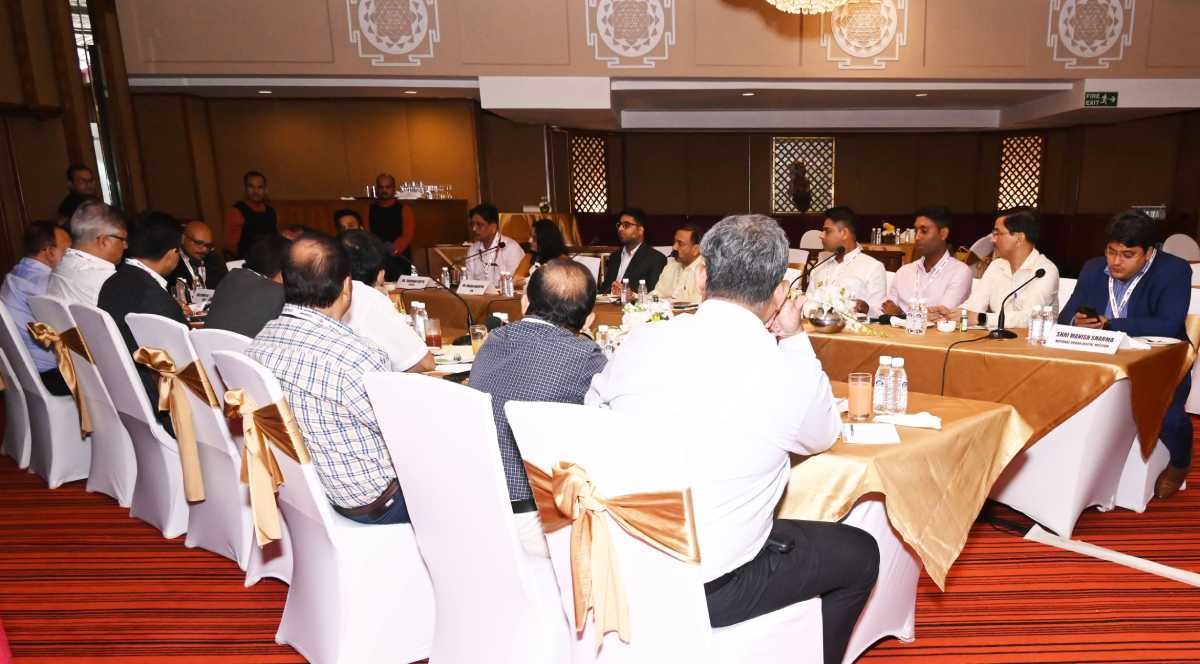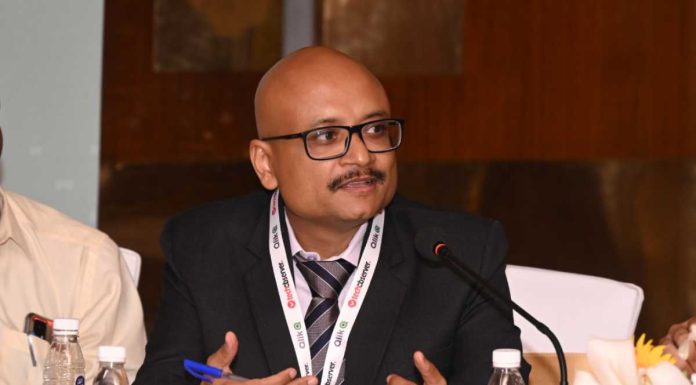With the aim to promote the use of data in strategic planning and bolster effective governance, Tech Observer Magazine and Qlik hosted a curated roundtable discussion — ‘Modernising Data Strategy for Digital India'. The programme was graced by the presence of esteemed government technology leaders, policymakers and technology experts.
More than 20 senior officials including Dr. Saurabh Gupta, Joint Secretary, National Intelligence Grid, Ministry of Home Affairs; Dr. Charru Malhotra, Head (eGov & ICT), Indian Institute of Public Administration (IIPA); Prashant Kumar Mittal, Director, National eGovernance Division, Ministry of Electronics and Information Technology; Akshay Patel, GM, NTPC; Jai Singh, Asst. Director, Employees State Insurance Corporation (ESIC); and Dr. Sushil Meher, Head of IT, AIIMS, among others participated in the discussion.
The central theme that resonated among all participants was India's forward-looking perspective towards data utilisation for effective public service delivery. India's public sector's zeal for data optimisation and its vision to bolster citizen-centric services and data-informed policy-making were applauded by all.
The speakers were of the view that India's swift movement towards digital transformation has been significant. They stressed that the platforms such as India Stack, UPI, Aadhaar, and ONDC signify India's robust digital aptitude. “These technological milestones not only enhance convenience for citizens but also signify India's push towards digital governance,” they said.
Expert Presentation: Data Strategy for Government and Public Sector
The programme began with an expert presentation by Nishikant Gupta, Director, Government Business, Qlik, who set the tone by encapsulating the essence of the data revolution, stating, “Data isn't mere statistics. It's the critical foundation of all our decision-making, predominantly in our public sectors.” He further said the different ways various government organisations are tapping into Qlik solutions to modernise data strategies, emphasising, “Harnessing data can pivot nations, ushering in transparency, a competitive edge, and a governance model par excellence.”
“Data is the keystone of deliberative processes, especially when public sectors are in question.” He also illustrated the transformative power of data, asserting, “When appropriately harnessed, it can chart novel pathways, epitomising transparency, fostering competitive edge, and fortifying governance.”
In his remarks, Nishikant also broadly explained various case studies, use cases and as to how various government departments and public sector units are utilising Qlik solutions for modernising their data strategy and using data as a strategic governance asset.
Citing an example, he said that Power Grid Corporation has implemented the Qlik Analytics platform to enhance its business operations. The platform includes Qlik Sense, Qlik NPrinting, and Qlik SAP Connector, benefiting various departments like O&M, Projects, Billing, HR, and more. Before this, data management posed significant challenges, with no real-time alerts or automated reporting. Nishikant explained that the current architecture is robust, with a 4-node Qlik Sense deployed for high availability and automatic failover. Data sources range from SAP ECC to MySQL and flat files.
Similarly he said that to elevate process efficiency and transparency, the Government eMarketplace (GeM) has also adopted the Qlik Analytics platform. Utilized for dashboard creation and data visualization, the platform is now an integral tool across more than 60 ministries.
Carving out a transformative role in India's public sector
Nishikant said that Qlik's Analytics platform is carving out a transformative role in India's public sector governance by enabling insightful, data-driven decision-making across various ministries and departments. From the Prime Minister's Office to individual sectors like labour, women and child development, and public health, Qlik offers a unified dashboard that serves real-time insights for an array of applications.
Stating that one of the platform's remarkable features is its ability to employ Auto Machine Learning (Auto ML) and advanced analytics for real-time fraud detection in welfare schemes, he said it also provides early warning scores to predict phenomena like school dropouts or delays in project execution.
“Moreover, the platform ensures data integrity by facilitating data deduplication and the creation of ‘Golden Records' for citizens. This acts as a single, reliable source of truth, thereby heightening transparency and accountability,” he said.
Roundtable Discussion: Unleashing the Power of Data for Government & Public Sector

The expert presentation was followed by a powerful roundtable discussion on the topic of “Unleashing the Power of Data for Government & Public Sector.” Speakers delved deep into the government's commitment to embracing real-time and batch-mode data from diverse sources.
Participating in the discussion, Dr. Saurabh Gupta, Joint Secretary, National Intelligence Grid, Ministry of Home Affairs, said, “We're in an era where conventional governance paradigms are being recalibrated. Data is not just an adjunct; it's steering our nation to enhanced transparency and a competitive edge unparalleled.” He continued to stress the indispensability of immaculate, curated data which inspires unwavering confidence.
“We all wish for data integration but in a complex set up like the government, it is easier said than done,” he said.
Concurring with Dr. Gupta, Dr. Charru Malhotra, Head (eGov & ICT), Indian Institute of Public Administration (IIPA), highlighted, “Despite the enormous potential, the literacy rate in data remains dishearteningly low. Challenges encompass the intricacies of data sharing, ownership complexities, and pervasive mistrust,” she said.
Sharing his perspective, Prashant Kumar Mittal, Director, National eGovernance Division, Ministry of Electronics and Information Technology, emphasised the monumental task of ensuring data quality when ownership is dispersed across various governmental departments. On the other hand, Abhijit Ghosh, Delhi's Drug Controller, pinpointed the need to identify data inconsistencies, especially concerning counterfeit pharmaceuticals.
Other experts, including Akshay Patel, GM, NTPC and Jai Singh, Asst. Director, Employees State Insurance Corporation (ESIC), presented their insights on data integration and quality challenges. Jai Singh said, “Ease of use is often overlooked in RFPs, yet it's crucial. Furthermore, when data collection is flawed right at the entry point, the repercussions on data quality are considerable.”
Shedding light on the PSU perspective, Akshay Patel, GM, NTPC, shared insights into the ever-evolving data landscape of modern organisations. Emphasising the critical nature of integrating machine data with IT data, he mentioned, “At NTPC, we've recognised this need and have proactively taken steps by implementing a data lake solution to streamline our data management.”
Dr. Sohan Lal Nautiyal, Principal Consultant, MeitY, underscores the criticality of prioritising data quality and governance, especially in light of the recent enactment of the Data Protection Bill. Leveraging his extensive expertise in the field, Dr. Nautiyal advocates for “robust data management strategies that not only ensure compliance but also enhance organisational efficiency and trust.”
Modernising data strategy must for government
The speakers also shed light on data privacy, security, and the IT legacy challenges faced by many government organisations that have heavily invested in existing IT infrastructure. Saurabh Dhoundiyal, Deputy Commandant, CISF, mentioned challenges associated with integrating legacy applications within security infrastructures. He said, “It's imperative that we address this to enhance the efficiency and responsiveness of our operations.”
Addressing the pivotal role of data privacy, Dr. Sushil Meher, Head of IT, AIIMS, underscored the critical responsibility associated with handling sensitive health data. He emphasised, “In the healthcare sector, data privacy transcends mere best practices; it stands as a cardinal principle. Patient data is sacrosanct and must remain confidential.” Recognising this challenge, Dr. Meher suggested the adoption of advanced encryption techniques and stringent data access protocols to ensure that patient information is safeguarded at all times.
All the participants agreed that modernising the data strategy for government and the public sector is paramount in today's fast-evolving digital landscape. As the backbone of governance and public service delivery, a robust and contemporary data strategy ensures increased efficiency, transparency, and accountability. When governments harness the potential of advanced data analytics, machine learning, and AI, they can derive actionable insights that lead to informed decision-making, resulting in more effective policies and interventions.
“In essence, modernising data strategy is not just a technological upgrade; it's a transformative step towards a more responsive, agile, and citizen-centric governance model,” said Dr. Charru Malhotra of IIPA.











